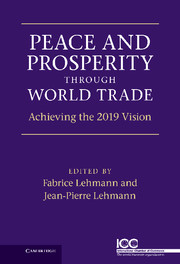Book contents
- Frontmatter
- Contents
- Notes on contributors
- Foreword
- Preface: the ICC vision
- Historical overview and dynamics
- Editorial note
- A Global systemic transformations
- Editorial introduction
- A1 Trade in the new Asian hemisphere
- A2 US allegiance to the multilateral trading system: from ambivalence to shared leadership
- A3 Trade for development: the case of China
- A4 Trade in the USA–China relationship
- A5 Unravelling India and strengthening external engagement for sustainable growth
- A6 Japan's contribution to an open trading system
- A7 Rebalancing Korean trade policy: from bilateral to multilateral free trade
- A8 Vietnam: a rising Asian tiger?
- A9 The European compact on trade still stands
- A10 Synergies with the Russian Federation
- A11 Reasons for an optimistic future view of trade and Latin America
- A12 Is the Brazilian giant finally awakening?
- A13 The Arab region and the GCC in tomorrow's trade
- A14 Growing African trade amid global economic turmoil
- B Governance of global trade
- C Poverty and global inequities
- D The long view on interlocking crises
- E Global business responsibilities
- Conclusion: the imperative of inclusive global growth
- Index
A14 - Growing African trade amid global economic turmoil
Published online by Cambridge University Press: 05 July 2011
- Frontmatter
- Contents
- Notes on contributors
- Foreword
- Preface: the ICC vision
- Historical overview and dynamics
- Editorial note
- A Global systemic transformations
- Editorial introduction
- A1 Trade in the new Asian hemisphere
- A2 US allegiance to the multilateral trading system: from ambivalence to shared leadership
- A3 Trade for development: the case of China
- A4 Trade in the USA–China relationship
- A5 Unravelling India and strengthening external engagement for sustainable growth
- A6 Japan's contribution to an open trading system
- A7 Rebalancing Korean trade policy: from bilateral to multilateral free trade
- A8 Vietnam: a rising Asian tiger?
- A9 The European compact on trade still stands
- A10 Synergies with the Russian Federation
- A11 Reasons for an optimistic future view of trade and Latin America
- A12 Is the Brazilian giant finally awakening?
- A13 The Arab region and the GCC in tomorrow's trade
- A14 Growing African trade amid global economic turmoil
- B Governance of global trade
- C Poverty and global inequities
- D The long view on interlocking crises
- E Global business responsibilities
- Conclusion: the imperative of inclusive global growth
- Index
Summary
For Africa, the 1990s heralded a crucial break from the grim ‘lost decade’ of the 1980s. In recent years, the African continent has undergone a remarkable political and economic transformation. Even though the continent is still faced with governance and development challenges, it is a far better place today than it was twenty years ago.
For one thing, Africa is by and large more politically stable today. Several civil wars, such as those in Angola, Rwanda, Sierra Leone and Mozambique, have ended and the number of inter-state conflicts has declined. Many African countries, including Liberia and Tanzania, have made appreciable progress in terms of improving governance and combating corruption. Other countries, such as Algeria, Niger and Sierra Leone, have shown marked improvements in strengthening the rule of law and in promoting government accountability.
The increasingly stable political environment across the African continent has coincided with an improving business climate. Over the past few years, a number of African states have implemented business-friendly reforms. In 2008, four African states – Botswana, Burkina Faso, Egypt and Senegal – were identified by the World Bank as among the top ten business regulation reformers in the world. These success stories have been emulated elsewhere on the continent. For example, until recently Rwanda had no commercial courts. This meant that disputes had to be resolved through the normal judicial system and the courts had to contend with a seven-year backlog of 3,000 cases.
- Type
- Chapter
- Information
- Peace and Prosperity through World TradeAchieving the 2019 Vision, pp. 64 - 68Publisher: Cambridge University PressPrint publication year: 2010



